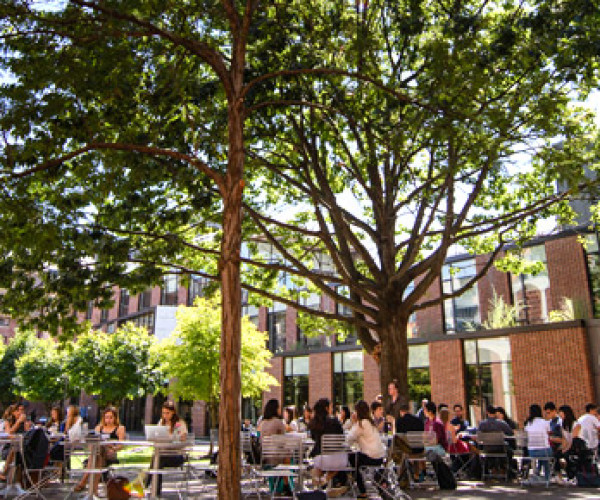Fighting an Uphill Battle: Examining the Legal Implications of COVID-19 on the Latinx Community
By Karli Ramirez L’22
The University of Pennsylvania Carey Law School’s Latinx Law Students Association (LALSA) held its 24th annual conference, “Fighting an Uphill Battle: Examining the Legal Implications of COVID-19 on the Latinx Community,” on April 3. Planned and hosted by Karli Ramirez L’22, the conference included two panels featuring brilliant advocates from law, government, and medicine.
The main goal of the conference was to bring light to the disparate impact COVID-19 has on Latinx communities. According to the American Medical Association, COVID-19 hit the Latinx population at a rate almost double that of the general U.S. population. A significant number of frontline and essential workers are Latinx, many Latinx individuals lack access to basic healthcare, and protection from disparate policies are needed now more than ever. Community-based responses have been instrumental in combating the effects of harsh immigration policies exacerbated by the pandemic, securing public benefits, and promoting the overall wellbeing of Latinx individuals across the nation.
“A Tale of Two Pandemics: COVID-19 and the Humanitarian Crisis at the Border”
The conference’s first panel, moderated by Victoria Ochoa L’21, featured perspectives from panelists Nicole Ramos, Director of Al Otro Lado’s Border Rights Project and adjunct professor at Temple University Beasley School of Law; Linda Corchado, Director of Legal Services at Las Americas Immigrant Advocacy Center; and Efrén Olivares C’05, Deputy Legal Director of the Immigrant Justice Project at the Southern Poverty Law Center.
The COVID-19 pandemic has significantly exacerbated the humanitarian crisis at the border, with immigration authorities taking advantage of prevention measures to fortify and expand structures of inhumane treatment. Without access to safe lodging, medical care, or a source of income, these individuals face struggles that require community intervention. The panel chronicled these secondary effects of COVID-19 in the immigration context and the ongoing fight against them in three distinct areas across the U.S.-Mexico border: Tijuana, Mexico; El Paso, Texas; and, throughout the Rio Grande Valley in Texas.
Panelists criticized the U.S. for using the pandemic as an unjustifiable excuse to keep immigrants out of the United States.
“It’s important to keep in mind that the border was never closed … U.S. citizens can come in, green card holders can come in, people with work visas can come in, even people with tourist visas can come in, as long as they do so by plane to this day,” Olivares noted.
Indeed, the border was only closed to immigrants seeking refuge in the United States, and the closure seemingly did not apply to those leaving the United States. The conversation sparked a poignant question by Ramos: “How is it that they (U.S. citizens) can come here for vacation, but we can’t go there to save our lives?”
Moreover, Corchado brought the focus to the difficulties that detainees, who made it across the border but remain in U.S. Immigration and Customs Enforcement (ICE) custody, face during this time. She noted that ICE procedural safeguards, which once allowed her organization to maintain communication with their detained clients, changed during the pandemic. Their only option for communicating with clients is now tablet-based, which discriminates against those who are illiterate or do not understand how to use the technology.
“Health, Labor, and Benefits: Advocating for Aid in the Pandemic Society”
The Conference’s second panel, moderated by Alexa Salas L’23, featured commentary from Maureen Olives, Managing Attorney at Philadelphia Legal Assistance; Mariel Mussack L’20, a Skadden Foundation Fellow at Justice at Work; Dr. Daphne Owen M’15, Volunteer Assistant Medical Director for Puentes de Salud; and Ida Castro, Vice President for Community Engagement and Chief Diversity Officer at Geisinger Commonwealth School of Medicine in Scranton, who serves as a member of the Pennsylvania Commission on Latino Affairs.
As the pandemic wears on, Latinx frontline and essential workers, in addition to many Latinx individuals left unemployed, grapple with issues such as securing healthcare, accessing public benefits, and maintaining their livelihoods in the face of uncertainty. The Pennsylvania Latinx population – in Philadelphia especially – relies on the advocacy of legal aid, social justice organizations, and government agencies to ensure that they may lead fulfilling and healthy lives during this challenging time. This panel explored the many ways in which prominent local and statewide advocacy groups have been at the forefront of the conversations on how to effectively aid the Latinx population.
Issues with reporting and compiling data on COVID-19 rates among the Latinx population make it exceedingly difficult to provide support for the community during the pandemic. Castro emphasized that she sees no reason “why Pennsylvania[’s Latinx COVID-19 infection rate] would be any different from the national figures,” which is nerve-wracking, as “the highest rate of… COVID-related infections are shared by the Hispanic community,” and “the highest death rate is in the Hispanic Community” on a national level.
The high incidence of COVID can be partially attributed to the fact that many members of the Latinx community are “essential workers or [work] a job that can’t be done remotely,” notes Owen.
This is why ensuring that these workers get protection that they’re legally entitled to is so important. For example, Mussack explained that low-income undocumented workers relied on Justice at Work to help them assert their rights at work in exploitive environments when the risk of retaliation could mean deportation threats or calls to ICE.
For those unemployed, Olives stressed that Philadelphia Legal Assistance saw a huge jump in people needing help ensuring their financial security. According to Olives, the incidence of unemployment aid cases jumped increased by 280% in the pandemic, as compared to 2019.
Read more about LALSA and its programs at the Law School.





